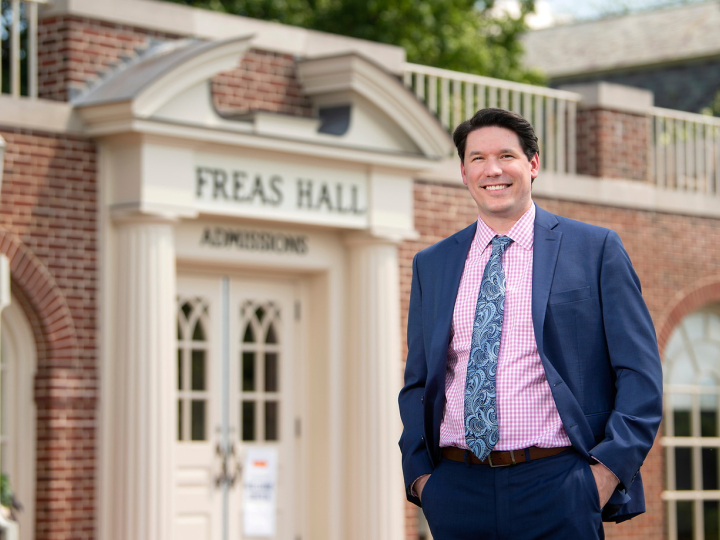Students Get Results in New Psychology Lab
March 5, 2018
The travel destinations, flowcharts and deadlines scrawled on the Bucknell Pediatric Behavioral Health Laboratory's crowded whiteboard tell visitors everything they need to know about the students who work there.
Drawn from the departments of psychology, education and mathematics, the lab's undergraduate researchers are producing scholarship that has secured them spots at national academic conferences hosted by organizations such as the Association for Behavioral and Cognitive Therapies, the Society of Behavioral Medicine and the Eastern Psychological Association.
"My goal is to get students working on quality research as quickly as possible and get them experience disseminating their results through conferences and publications," said Professor Anna Baker, psychology, who developed the lab in 2016.
While supporting Baker's research into pediatric behavioral health, the laboratory also provides students with a space to conduct studies on topics related to adults while they work toward defining their personal and professional goals.
"Many of these students will go on to doctoral programs, which are highly competitive," Baker added. "They need to be able to say, 'I can jump into research, from putting together a study right through to publication.'"
Find Your Path
The list of student accomplishments is already impressive.
For example, an abstract written by psychology major Emma Roberts '18, in collaboration with Baker and other scholars, has been selected for special recognition by the Society of Behavioral Medicine at the organization's spring 2018 conference in New Orleans. Roberts' study — supported by the Bucknell Program for Undergraduate Research — focuses on risk-taking behaviors and symptoms of depression among chronically ill college students.
"It's really exciting," Roberts said. "I came into the psychology program knowing I wanted to do clinical counseling work, but I wasn't aware of the huge potential for research to move me closer to my career goals until I began working in the lab."
Gaining Tools for Success
As an applied mathematical sciences major, Presidential Fellow Elise Covert '20 never expected to conduct research in a psychology lab. However, when she began to spot intersections between psychology and math, she approached psychology professors, including Baker, about the possibility of exploring areas of overlap between the two topics.
"I see myself going into data analytics in the future," said Covert, who is investigating how individuals weigh factors such as risk and cost when making medical decisions. The research, conducted with psychology major Cherie Doan '18 and accepted for presentation at the Eastern Psychological Association's 2018 annual meeting in Philadelphia, requires Covert to learn R, a software suite for data calculation, manipulation and graphic display. "When I had my first graph pop up, I did a little dance," she said.
Baker, who also collaborates on that study, noted that learning to work with R, while challenging, is potentially valuable regardless of a student's chosen field of study or career path. "Whatever field students go into, data analysis skills are important," she said.
Baker added that Bridgette Holland '20, who is majoring in neuroscience, recently earned an Emerging Scholars in Psychology Fellowship, which provides financial support to students who want to pursue compelling psychology research. Holland's current study focuses on the ways severe food allergies may affect young people's social lives.
"There's not a lot of research on the social impact of food allergies," said Holland, who plans to submit her literature review to the academic journal Pediatrics.
Covert added that Bucknell's liberal arts tradition helped her bridge the gap between math and psychology. "There's something to be said for a school where a math major is welcomed into a psychology lab," she said. "Whatever you want to study at Bucknell, you can find a way to do it."
Baker said the lab provides opportunities for undergraduates to contribute to the scholarly conversation on behavioral health and potentially explore interdisciplinary connections.
"The whole point," she said, "is to ask students where they want to go, then give them the tools to get there."

